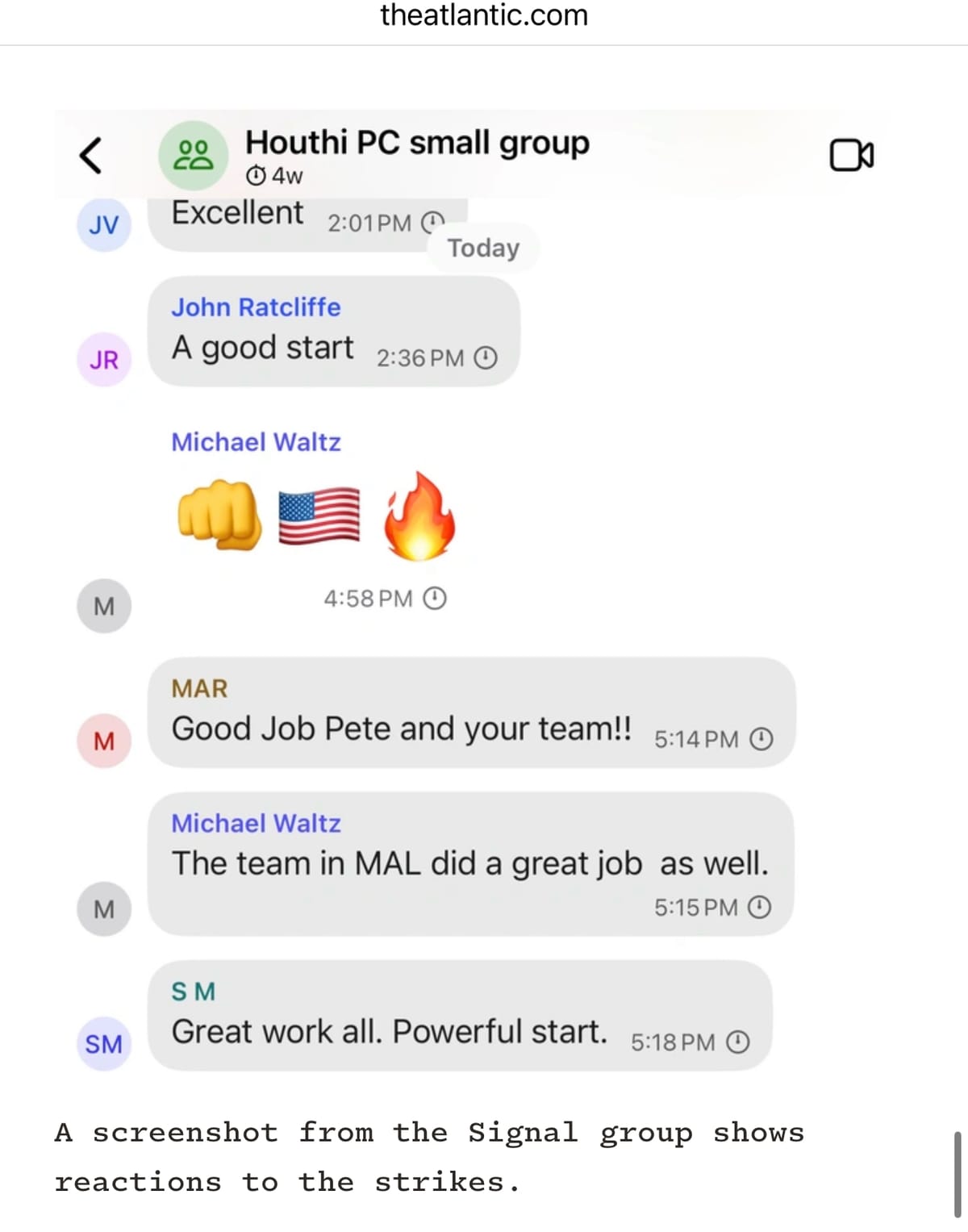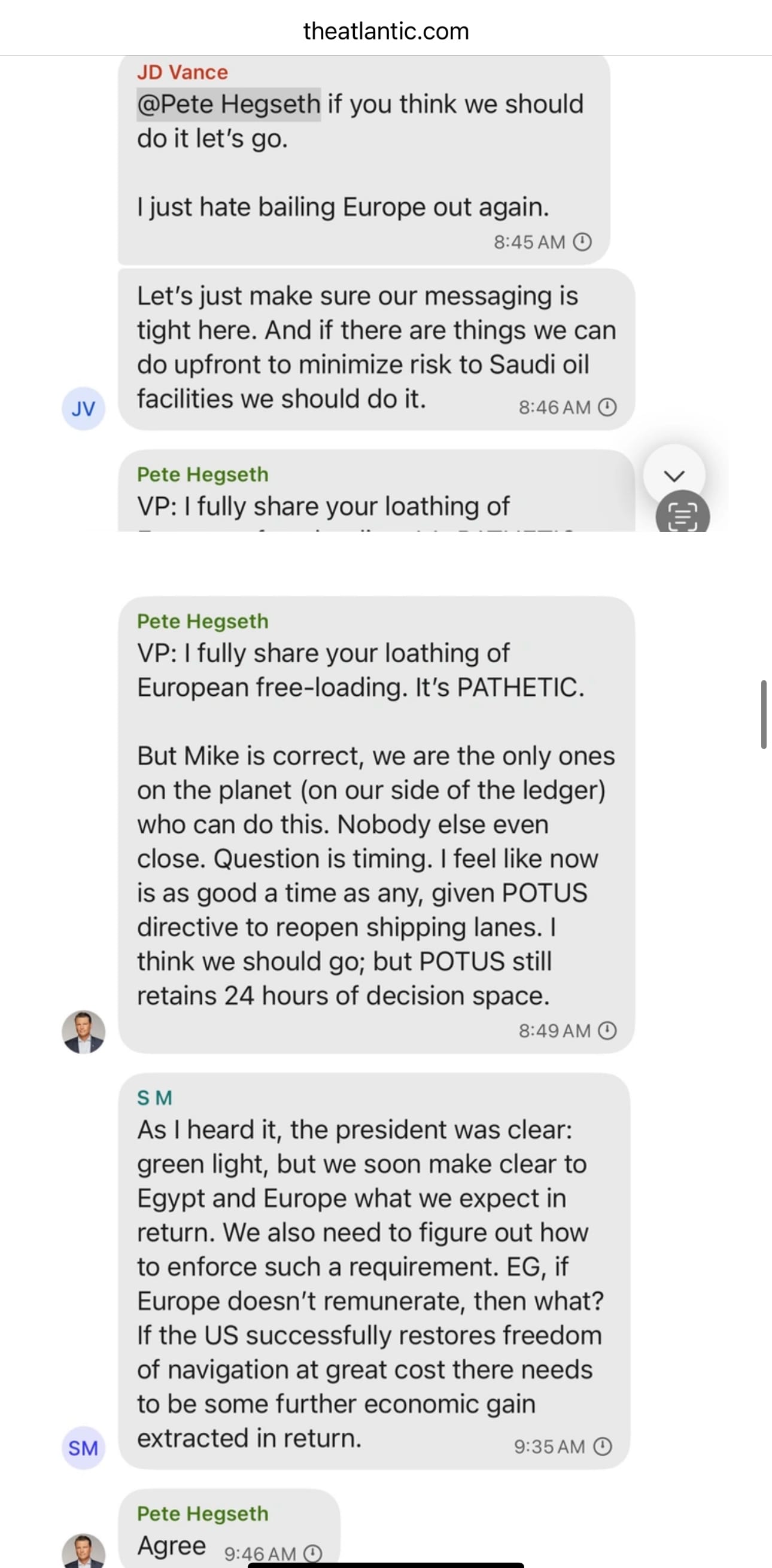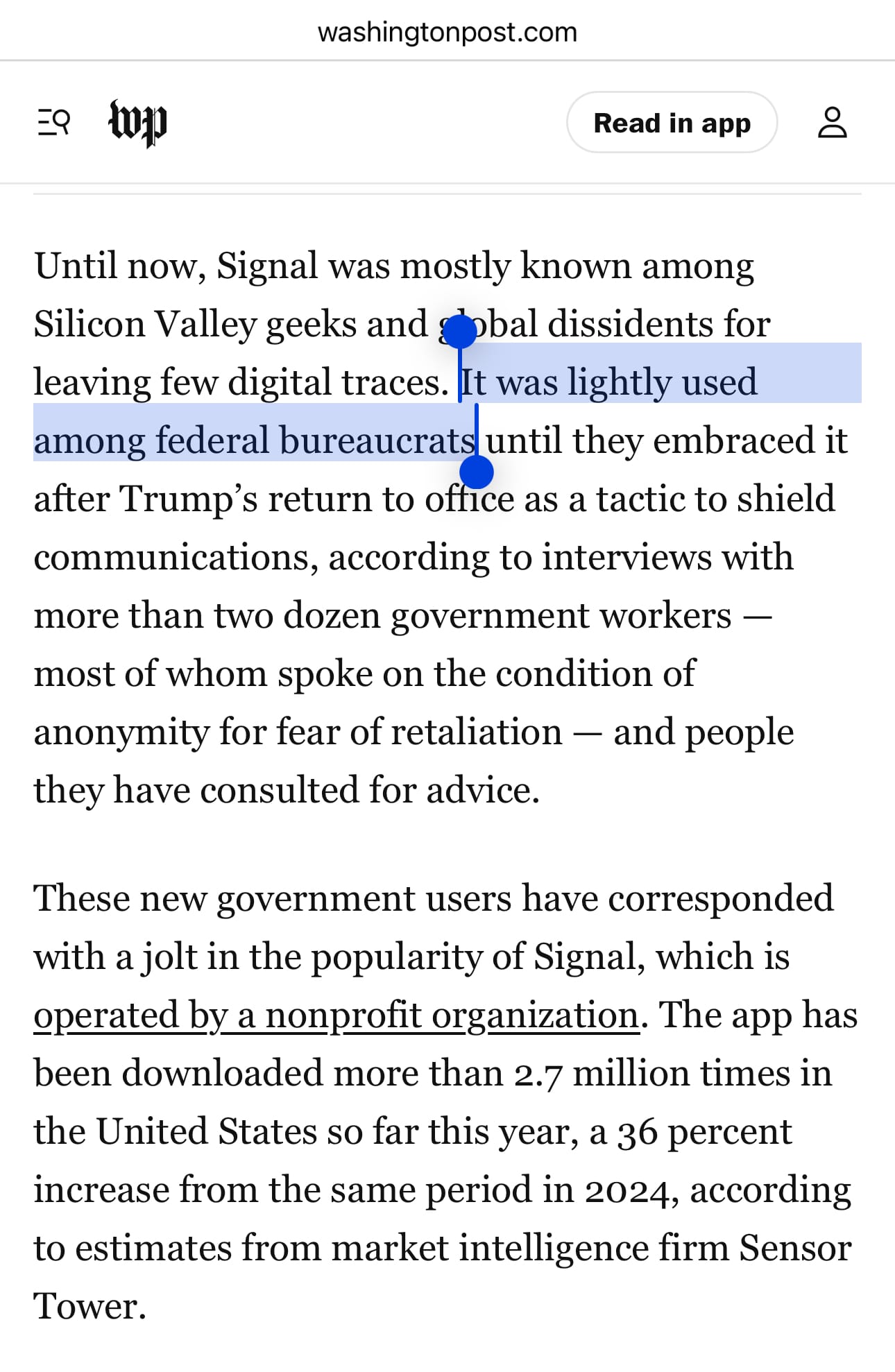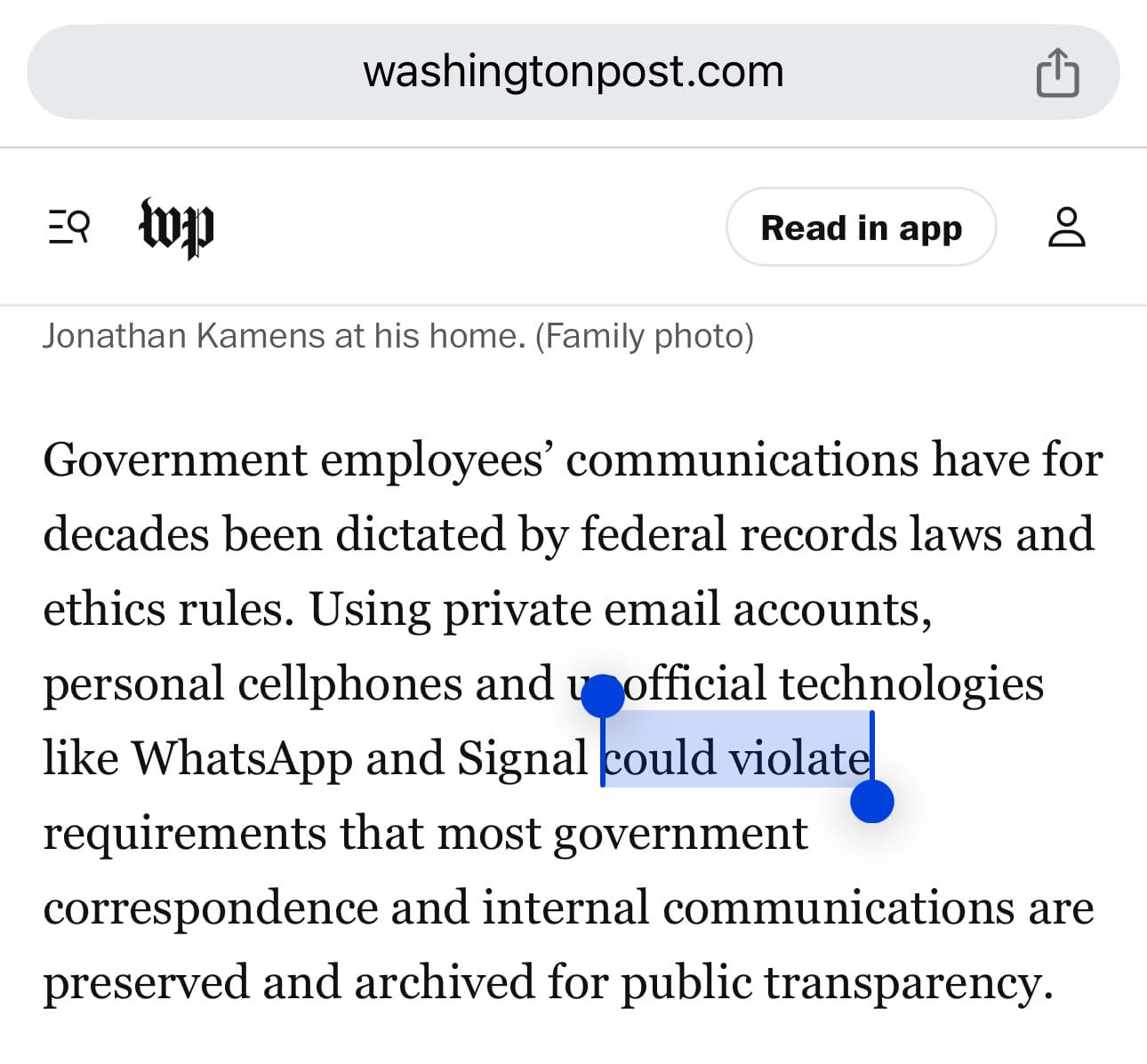What #SignalGate means for transparency & accountability — and what Congress & the Justice Department should do now.

Good afternoon from Washington, where I’m watching a historic scandal unfold in real-time. I’m sorry to have been out of pocket for a bit, dealing with family and medical issues. That ends today. I'm glad to see more folks subscribing to Civic Texts these last weeks: thank you. Please consider upgrading to a paid membership if you are able, or let me know alex@governing.digital what I need to do to earn your support.
Finding Signal in the Noise
This Tuesday, I need to comment a signal scandal in American history with you and the broader public. (Stay tuned for more on Sunshine Week.)
First, if you haven’t read Atlantic editor Jeffrey Goldberg’s article yet, here’s a gift link to read and share with your fellow Americans.
All caught up with one of the most surreal intersections of technology, national security, and human error in living memory? Good!
Here’s a few thoughts on what “SignalGate“ means for government transparency and accountability — and what Congress and the Justice Department should do in response.
First, let me acknowledge that Defense Secretary Pete Hegseth and National Security Advisor Mike Waltz may have violated the Espionage Act by sharing top secret war plans with a journalist present in a chat on Signal. (Yes, that really appears to have happened!)

National security classified information are where growing sound and fury is (reasonably!) focused, including calls for their resignations, but it’s the part of the story I need to focus on today.
This Signal chat with Hegseth, Waltz, Secretary Marco Rubio, et al generated federal records that should be archived. In fact, Vice President Vance and White House advisor Stephen Miller’s texts are presidential records, with a higher standard for preservation.
“The question of how secure Signal is should be secondary,” as transparency expert Lauren Harper observed today. “The most important question is: does it allow for preservation of records?”
“Federal officials can't use non-government systems for work unless, with rare exceptions, they can forward copies of those comms to official systems within 20 days.
These were National Security Council discussions so the records are considered presidential records which means 1) they are permanent and must be preserved and 2) should subject to FOIA 5 years after the end of an administration.”
If Waltz set posts in this Signal chat to disappear, then he was (ironically) showing good security hygiene by minimizing data, but of course displayed an epic lapse in judgment by including Goldberg.
That would also mean the White House National Security Advisor intentionally destroyed public records by default, instead of archiving public business as required under the Presidential Records Act & Federal Records Act.
“Under the records laws applicable to the White House and federal agencies, all government employees are prohibited from using electronic-messaging applications such as Signal for official business, unless those messages are promptly forwarded or copied to an official government account,” Jason R. Baron, a professor at the University of Maryland and the former director of litigation at the National Archives and Records Administration, told the Atlantic.
“Intentional violations of these requirements are a basis for disciplinary action. Additionally, agencies such as the Department of Defense restrict electronic messaging containing classified information to classified government networks and/or networks with government-approved encrypted features,”
While the Washington Post claimed Signal has been “lightly used among federal bureaucrats until recently, it was infamously used by White House officials in the first Trump administration. Remember Jared Kushner in 2019? The continued use of personal email in the Trump White House showed the accountability hole in public records laws.

It was an error to omit this history. I don’t know why the Post also added ambiguity about whether it’s legal to use ephemeral messaging to conduct public business, in defiance of the Federal Records Act or Presidential Records Act, or subsequent reforms that attempted to address it.

It’s not. Everyone in that chat should have known it wasn’t ok.
In fact, the existence of the chat raises huge red flags about Signal uses across the Trump administration that merit swift action. Unfortunately, we must assume these officials were hiding public business from posterity, just as Kushner did in the first administration. As was true then, it looks like an intentional effort to evade transparency and accountability.
While an bill sponsored by Rep. Elijah Cummings passed into law in the 2021 NDAA, successfully extended archiving to electronic messaging, any future White House‘s compliance with the Presidential Records Act still remained on the honor system. “Trust but verify“ won’t work with this administration.
If Trump’s first act exposed a statutory hole, his second act appears to be blowing that void wide open after he evaded accountability for retaining classified presidential records after leaving office.
In the Electronic Messaging Preservation Act (EMPA) passed in 2021, Congress instructed the Archivist of the United States to promulgate regulations governing preservation of electronic messages determined to be records.
The acting Archivist did so, when the National Archives issued a final rule in December 2022 and 2023 guidance on electronic messaging for all agencies.
In another timeline, the Archivist would be testifying about an emergent records issue, issuing statements, and sending reminders to all agencies about their obligations to memorialize public business, where ever it is conducted – but Trump fired the Archivist of the United States without telling her or Congress why. And, in a surreal turn of history, Secretary of State Rubio is currently designated as acting Archivist, which means he should be counseling himself about the records-keeping obligations he or his staff appear to have been privy to on the chat.
Such maladministration is the opposite of good governance. It's why Congress should insist on a nonpartisan, Senate-confirmed official serve as AOTUS across administrations, not a loyalist acting in the role.
The White House National Security Council confirmed the authenticity of a chat to The Atlantic. Intelligence officials testifying before the Senate did, too, albeit reluctantly, with persistent inability to recall what was shared.
But as of today, it looks like top officials in the Trump administration broke public records laws and may well have violated the Espionage Act.
What should come next?
U.S. Attorney Pam Bondi should appoint a special counsel to investigate if Signal use for public business is a pattern and practice across this administration and the last.
It must not be the case that guidance and warnings the Department of Justice issued to the private sector about ephemeral messaging apps and preserving records do not apply to the public sector when the laws and regulations about such obligations are even clearer.
Every elected leader in Washington should acknowledge that the lawlessness of this behavior must be unacceptable under our laws, no matter what political party is in power or identity of the officials, not resort to deflection, excuses, or whataboutism.
Attacking the credibility and professionalism of a journalist who acted ethically by reporting the chat to the National Security Council while witholding operational details and the identity of an active intelligence office is an authoritarian play intended to delegitimize journalism and cast doubt, not to inform and recognize the responsibility of a member of the American free press.
This isn’t just simply carelessness or negligence around national security. It's a flagrant denial of the public’s right to know.
Today’s Senate hearing on worldwide threats with intelligence community leaders was exquisitely well-timed, but it is only the start of public accountability for what this chat revealed about how the Trump administration is not upholding public trust.
Congress should immediately schedule more oversight hearings that focus on more than security matters and sharing classified information on Signal. Relevant committees of jurisdiction should call every official involved in this chat to testify about how and when Cabinet principals & their staff have used Signal or other ephemeral messaging apps to conduct public business. They should ask the GAO to immediately investigate this issue, with the expectation of rapid response.
All Cabinet heads must be called to answer questions about their knowledge of public records laws and obligations, including how archiving requirements have been upheld. What agencies appear to be doing now strongly suggests records laws are being violated, so oversight should include regular followups and audits regarding the use of such apps to evade accountability and transparency.
Congress should draft and markup legislation to close the accountability hole persisting in the Presidential Records Act, perhaps by making it the fiduciary duty of the White House Counsel to attest that officials have been given an ethics briefing, understand their obligations under the law to preserve public business conducted on electronic messaging systems, and to blow the whistle if they become aware of others doing so.
Congress must act to hold the executive branch accountable for preserving public business under the law, now, including the dismissal of the AOTUS and deputy AOTUS who act as the guardians of public records for the American people.
What's past is prologue. We must learn from the past and apply its lessons to today, from Watergate to Signalgate. Public records of public business must not be erased by default, enabling officials to deny Americans the knowledge necessary for self-governance.



